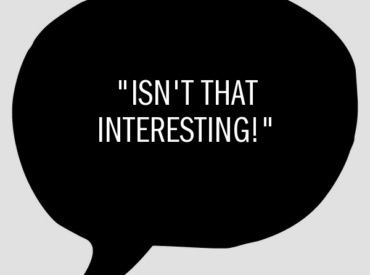Don’t Be Food for the Fodder
If you’ve ever gone through a rough patch and your friends know, they ask how you are doing. You may not want to share at first depending on your nature, but eventually you may break down and spill the beans because it feels good to get it out.
It’s good to have friends and family who support us and care about us. They mean well when they ask how we’re doing especially if we’re going through a tough time.
Sometimes, unknowingly we can become food for the fodder. We may think we’re helping ourselves by relaying what’s going on in our lives. Some discussion is fine, but when it becomes repetitive not only is it damaging to us in the long-term, our well-meaning friends can start to unintentionally thrive off of our “woe is me” tale.
Resist the Urge to Spill it All the Time
Next time you catch up with your bestie she asks how you’re doing. You’re tempted to spill it again. So, you do. She doesn’t realize it but eventually she gets hooked on your tales. It’s like gossip – hearing someone else’s misfortunes takes your mind off of your own and depending on your mindset, can make you feel better about your own life.
I’m not saying your friends or family are bad people for asking how you’re doing. It’s just that although they care about you, they can start to almost get addicted to hearing about your challenges.
They care, but they want to hear the gory details. “You did what?” and “He said what?” and “No! You moved out, really?”
They can’t wait (subconsciously) to hear the next installment. It’s like impatiently waiting for the next episode of a soap opera.
But this isn’t a soap opera, it’s your real life, even if it is full of drama.
Over-sharing Can Be Addictive
The flip side of the coin is you. You can get subconsciously addicted to sharing your troubles. Sometimes our pay-off is to gain sympathy or attention or keep us stuck in victim mode.
Case in point: me. A few years ago, I was going through a rough time. Every time I’d go to lunch with a girlfriend or talk to other friends or family, they’d ask how I was doing. I knew they meant well so I thought nothing of spilling my guts. They care about me so what’s the harm, right?
Once or twice or even a handful of times is fine. After that, it’s time to stop over-sharing, work through it on your own or get professional help if it’s crises time.
The more I repeated my troubles, the more they stayed in the forefront of my mind and the longer they continued. Was repeating them the only thing that kept me from moving on? No, but it sure didn’t help. You know the drill from law of attraction: what you think about, you bring about. So, the more you think and talk about something, the more it continues.
I wasn’t doing myself any favors by discussing my drama over and over. I knew it, but I couldn’t stop because I was in so much pain. When you have obliging and well-meaning friends who can’t wait to hear the next chapter of your story, it’s all too tempting to give it to them. It sets up a cycle. They ask because they care and possibly subconsciously want the dirt and you spill because you want to feel supported. The more you spill, the more they ask.
What it does is keep you in the problem.
Friends Mean Well, But…
When you’re deep in the problem you can’t see your way out. Many friends aren’t equipped to effectively help you with your troubles. I don’t mean that to be rude, but honestly, before I was a coach, I wasn’t either. We’re not trained to help others through crises, that’s what professionals are for. Yes, some friends may be better able to help with that, but most people aren’t because they don’t know how. Or they unknowingly give unwanted or detrimental advice.
They let you drone on and on because they think it’s helping you get it off your chest. It is good to do that – to a point.
Once I finally realized I wasn’t helping myself by dwelling on my problems I had to inform certain people that I’m either not going to discuss it or I’m only going to have a pity party for fifteen minutes, then I’m changing the subject. I appreciate your concern, but now I’m done for the day.
Those that honestly care will understand. Everyone in my support network got it. There were no hurt feelings. They just wanted to make sure I was ok. And I was. And I kept getting more ok the less I shared. I know it seems counter-intuitive to cut yourself off, but it actually is more loving to yourself. Don’t dwell on it otherwise what you think about, you bring about.
How Can You Help Yourself?
Set your boundaries and set your timer. Tell your loved ones you’ll only discuss it for however many minutes. (Don’t make it more than thirty.) Then, cut yourself off. Stick to it. If they keep interrupting you or wanting more, reinforce your limits.
Journaling is always a great way to get your feelings out. If you want confidentiality rip up the paper or delete it off your device.
If you need feedback that’s where a trained professional can come in. It’s one thing to journal and vent what a jerk so and so is but another thing to gain perspective about the ordeal. Oftentimes we don’t see our part in situations. It takes two to tango as my dad used to say. The other person truly may be acting like a jerk, but what was your reaction? Did you yell back? Or did you put up boundaries or walk away? Did you misinterpret the situation entirely? See what I mean? We don’t usually see our part, mainly because we’re hurt or angry.
Because our friends and family love us, they’re going to take our side. While we appreciate that, it isn’t objective. They’re going to agree with you no matter what you say. While that may feel good in the moment, in the long-run, it’s not helping you. It keeps you stuck in the “it’s all their fault” mode.
If you know someone who has great wisdom or perspective in life, great, talk to them. This isn’t an endorsement for therapy or coaching. It’s just that most people don’t have the objectivity to see the overall picture, especially if they care about you. And most people don’t want to cut you off when you’re on an hour-long roll. They assume you need to get it out. You do, but not an hour’s worth all the time.
Start advising your friends how to help you next time you’re going through a hard time. Give them constructive questions to ask you. Jot some down now when you’re not in crises because when you’re in the midst of it, it’s hard to think of anything but.
Take it from me. I went from an over-sharing mess to learning to set boundaries to protect my mental health. Guess what happened? The situation started to resolve itself because I stopped dwelling on the issues. That wasn’t all that did it, but it was a major factor.
Bottom line is if you want to get out of crises or drama mode, do your best to stop thinking and talking about it. Set a timer for yourself too. When you catch your mind drifting off to your problems again, stop right there and think about something else.
Remember, what you think about, you bring about. Bring about positive things. Let go of the drama mama.
If I can do this, you can too.






